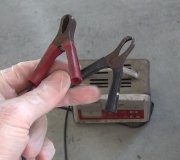You're better off returning this battery and getting the right one. You still have to worry about the battery's posts hitting the bottom of the hood when they're in the wrong place too.
When it comes to how long a battery will last, they all fail eventually because the lead flakes off the plates and collects at the bottom. As that occurs over the next few years, it will still be able to start the engine, but it will not be able to run your radio, for example, as many hours as when it was new, before it is run dead. The manufacturers know how quickly that lead is going to flake off, and they provide the longest warranty they can based on that. When enough of that lead builds up at the bottom of a cell, it shorts the plates together, then the battery has to be replaced. Most commonly that occurs in about five years but a lot of batteries do last longer than that.
You also have to look at the cold cranking amps, (CCA) of a replacement battery. All that's important is the new one has the same or higher rating than the original battery. It's almost impossible to find one the same as the original. All replacement batteries are much better in that regard. A higher CCA rating is needed for cranking larger engines but when used in a small car, you just have a lot of extra potential power that will never get used. If the engine is running properly and the starter and cables are in good shape, you'll never notice that the battery has more power than is needed. Where the higher CCA rating has benefits is for those of us who live where it gets real cold in winter. Below zero degrees, since a battery is a chemical reaction, they lose about half of their power. Also, due to the engine oil becoming real thick, it takes about twice as much power as normal to crank the engine on a cold day. The battery is half as strong and the engine needs double the power. The manufacturer chose the original battery to meet those conditions, but with no extra to spare. Any new battery you find is going to have considerable extra power to spare.
Other than that cold weather, there's no substantial benefit in buying a larger battery. It's still going to fail, on average, in five years. To say that a different way, suppose you had an ice cube and you placed in a hot sidewalk in summer, and suppose it melted in five minutes. Now suppose you had two ice cubes and you did the same thing. They still would both be melted in five minutes. Having twice as much doesn't make it last longer. Twice as much just melts twice as fast. The same is true with all that extra power in the battery.
When there is a real improvement developed, it isn't long before every other manufacturer adopts them and incorporates them into their products. As a result, you might get a really good battery from an auto parts store one time and one that fails under warranty and the exact opposite might occur for the next person.
Thursday, December 31st, 2020 AT 10:31 AM
(Merged)






